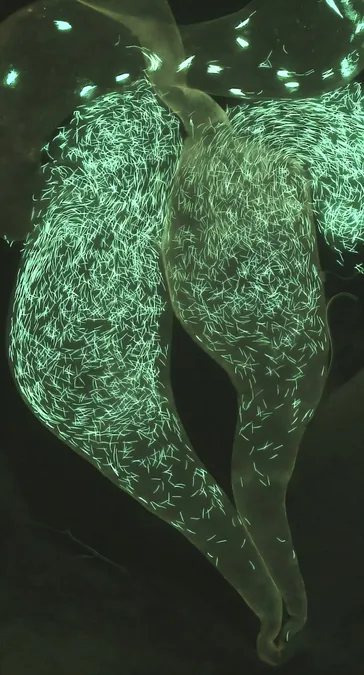
Unlocking the Secrets of Fertility: How Seminal Fluid Can Reverse Age-Related Decline in Male Fruit Flies
2025-01-21
Author: Sophie
Introduction
As male fruit flies age, their ability to reproduce typically diminishes, a process known as reproductive senescence. However, groundbreaking research from the University of Oxford has uncovered that this decline is not simply a result of having fewer sperm, but rather is tied to a decrease in the quality of seminal fluid. This remarkable discovery sheds light on the vital function of seminal fluid in reproductive success, revealing significant implications not just for fruit flies but potentially for animal fertility and human IVF treatments as well.
Challenging Traditional Assumptions
The findings, published in *Evolution Letters*, challenge existing assumptions about male fertility. Traditionally, it was thought that older males were less fertile due to lower sperm production. Conversely, this study shows that older male fruit flies (Drosophila melanogaster) actually possess more sperm due to accumulation over time and can transfer similar or even greater amounts during mating. The catch? Female fruit flies tend to store fewer sperm from older males, leading to a reduced number of offspring from these couplings.
The Role of Seminal Fluid
This perplexing phenomenon may result from the females ejecting a higher proportion of sperm from older males shortly after mating or due to the poor quality of seminal fluid produced by these older males. Seminal fluid—a vital part of the male ejaculate—contains essential nutrients and proteins that facilitate fertilization, sperm storage, and egg-laying, making its quality crucial for reproductive success.
Implications in Polygamous Species
The significance of this research extends further, especially in the context of polygamous species, where males often mate with multiple females. Here, the investment in both sperm quantity and seminal fluid quality becomes even more critical, as producing ejaculate is energetically taxing.
Experiment on Seminal Fluid Supplementation
To delve deeper into the role of seminal fluid, the researchers conducted an experiment where they supplemented older females with the seminal fluid of young males (without any sperm involved). They found that this supplementation dramatically improved the reproductive success of older males, leveling the playing field with their younger counterparts. This finding unveils a substantial advantage for males in polygamous settings: the seminal fluid from previous partners can boost a male's fertility.
Expert Insights
Dr. Krish Sanghvi, the lead author of the study, emphasized, “We show that different components of the ejaculate—sperm and seminal fluid—decline at different rates with age and through mating sequences. The drop in reproductive output from old males is chiefly driven by seminal fluid degradation and altered sperm storage behavior in females.”
Future Research Directions
These results highlight the critical yet often underestimated role of seminal fluid in male fertility, especially within the dynamics of sexual competition and selection. They suggest that the decline in reproductive capabilities in older males is not irreversible; when provided with high-quality seminal fluid, male fertility can be revitalized.
Dr. Irem Sepil, the senior author, pointed to exciting future research avenues: “We can explore the applicability of seminal fluid supplementation techniques in humans. For instance, seminal fluid transplantation from healthy, fertile donors might offer a promising approach to enhance fertility in those struggling with infertility.”
Conclusion
The implications of this revolutionary study could extend far beyond fruit flies, offering new strategies for enhancing fertility in various species, including humans. If successful, these findings may lead to life-changing advancements in reproductive health and IVF methodologies. Stay tuned for further developments in this groundbreaking field!









 Brasil (PT)
Brasil (PT)
 Canada (EN)
Canada (EN)
 Chile (ES)
Chile (ES)
 Česko (CS)
Česko (CS)
 대한민국 (KO)
대한민국 (KO)
 España (ES)
España (ES)
 France (FR)
France (FR)
 Hong Kong (EN)
Hong Kong (EN)
 Italia (IT)
Italia (IT)
 日本 (JA)
日本 (JA)
 Magyarország (HU)
Magyarország (HU)
 Norge (NO)
Norge (NO)
 Polska (PL)
Polska (PL)
 Schweiz (DE)
Schweiz (DE)
 Singapore (EN)
Singapore (EN)
 Sverige (SV)
Sverige (SV)
 Suomi (FI)
Suomi (FI)
 Türkiye (TR)
Türkiye (TR)
 الإمارات العربية المتحدة (AR)
الإمارات العربية المتحدة (AR)